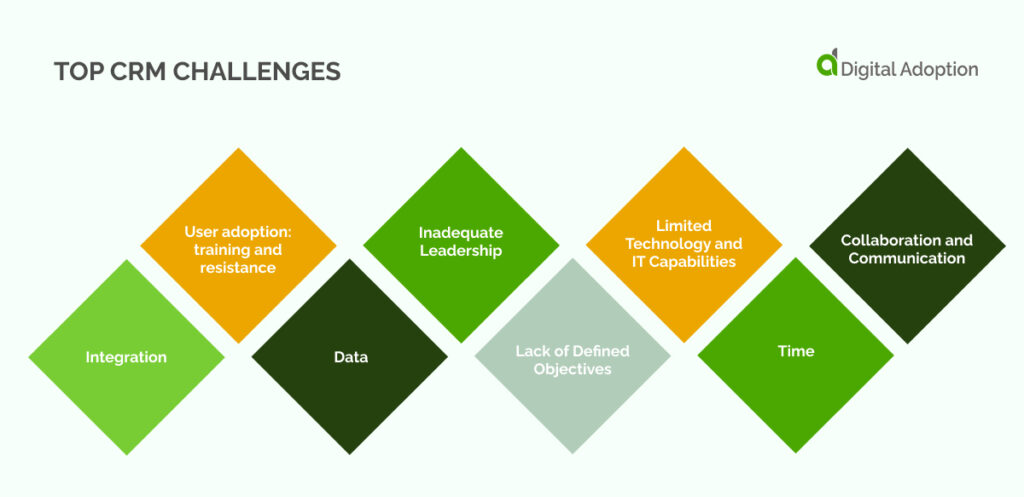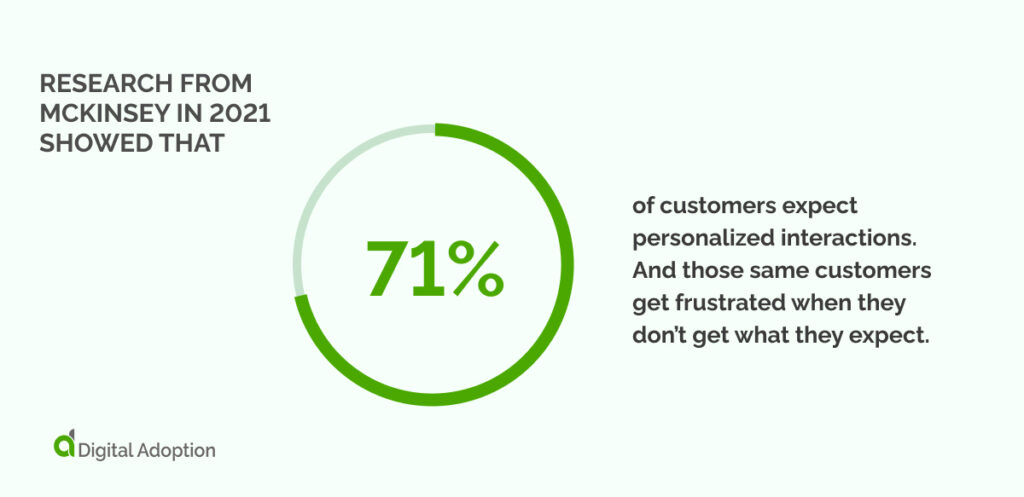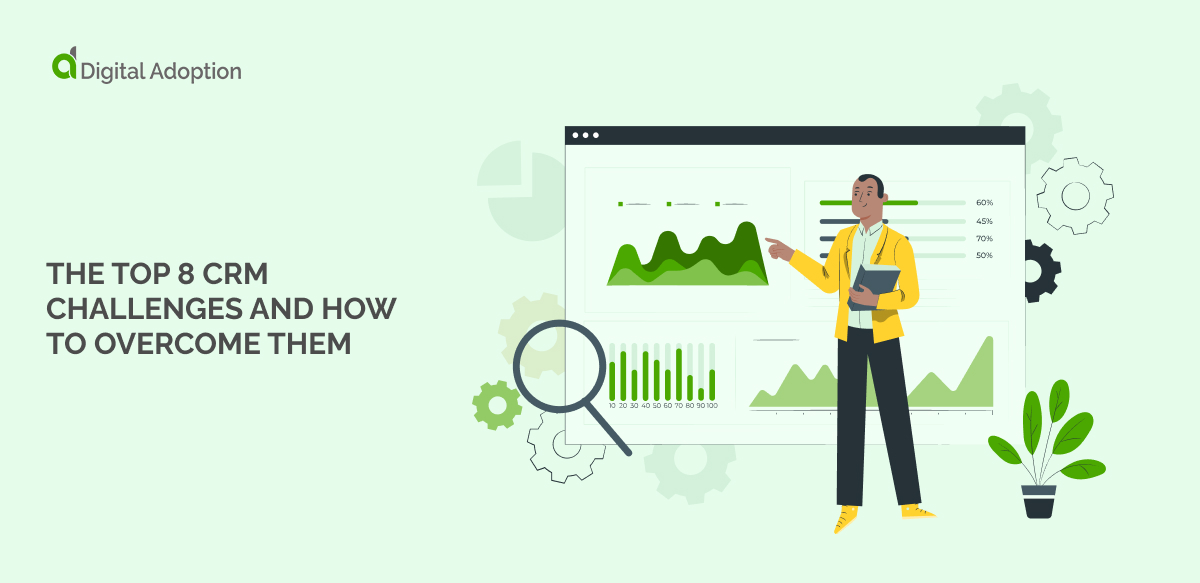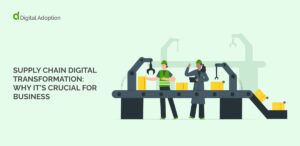Back in the day, customer relations were impossible without reams of paper.
Business cards, rolodex cards, filing cabinets, all of them spilling over with contact details and previous transactions.
We’ve come a long way from those times. In the age of ubiquitous desktop computers and cloud-based software, Customer Relationship Management (CRM) tools provide a fantastic way to improve connections between you and your clients.
But CRM implementation is a tricky business. Whether you’re using an out-of-the-box CRM or a homegrown solution, you’ll have to overcome a few challenges before you really start to reap the rewards.
In our view, CRM challenges are worth overcoming. Salesforce research shows a good CRM can improve revenue by 29%, productivity by 34%, and sales forecast accuracy by an outstanding 42%. If you make the time to understand CRM problems, the solutions can follow just as easily.

In this article, we’re going to explore the 8 biggest challenges you’ll face when implementing your own CRM. These are:
- Integration with existing technology
- User adoption
- Data management
- Getting leadership buy-in
- Defining objectives
- Limited IT capabilities
- Time
- Collaboration and communication
- Top CRM challenge #1: Integration
- Top CRM challenge #2: User adoption: training and resistance
- Top CRM challenge #3: Data
- Top CRM challenge #4: Inadequate Leadership
- Top CRM challenge #5: Lack of Defined Objectives
- Top CRM challenge #6: Limited Technology and IT Capabilities
- Top CRM challenge #7: Time
- Top CRM challenge #8: Collaboration and Communication
- Customer relationship management: a key to business success
Top CRM challenge #1: Integration
Our first challenge is a technical one— connecting your new software with older software packages.
The disparity between modern CRM solutions and older technology results in compatibility issues and a lack of data-sharing interfaces. This limits real-time data access, impacting the timeliness and accuracy of customer service.
Overcoming integration challenges requires meticulous planning, potential custom development, and substantial time and financial commitments.
Such integration hurdles are critical in ensuring the CRM’s effective operation within your organization’s broader technology environment.
Top CRM challenge #2: User adoption: training and resistance
CRM adoption is the willingness and ability of an organization’s staff to effectively use the CRM system.
It’s not just about technical proficiency— but also about embracing the CRM as an integral part of their daily work. Faced with a complex new system, you run the risk of not getting the engagement you need from your employees.
Further to that, you might find that a poorly implemented system actually disenfranchises your employees. What was supposed to be a new tool to help them organize better and boost their productivity, ends up being an intimidating undertaking they don’t feel ready for.
The best solutions to this are communication, training, and support.
Communication can’t start early enough. Inform your employees of your plans to implement a new CRM as soon as you can. Not only does this give them more time to prepare, but you’ll probably find that they have valuable insight to share. After all, they’re the ones who will actually be using the new CRM.
CRM training is also a worthwhile investment. Whether you deliver it yourself or hire an external party to help your develop your employees’ skills, you need to see CRM training as an iterative process.
The impact of a CRM spreads across the whole business, so carefully consider who needs training. Weave your CRM training plan into your new starter processes. And consider delivering re-training opportunities on a regular basis- perhaps annually.
Top CRM challenge #3: Data
High-quality data is at the heart of efficient CRM operations.
It’s no surprise that every aspect of data management can challenge CRM adoption— data security, quality, duplicate data, leaks, accessibility, and more.
Data challenges in CRM adoption are multifaceted and touch every aspect of data management. They require a combination of technology, processes, and user vigilance to maintain data quality, security, and compliance.
Addressing these challenges is crucial for CRM systems to effectively support the organization’s customer-centric goals and operations.
Solving the CRM data challenges takes a multi-pronged approach.
Implementing robust data security measures, including encryption and access controls, helps safeguard sensitive information.
Regular data quality audits and maintenance routines can ensure that the CRM database remains accurate and up to date.
To tackle duplicate data, employing data deduplication tools and establishing data entry guidelines can streamline record management.
Preventing data leaks necessitates ongoing user training and a strong focus on security best practices. Data accessibility can be managed through role-based permissions and user profiles
Remember: all the data decisions you make will have an impact on your CRM performance. So, refreshing your data strategy could be a great step to making sure that the CRM performs well.
Top CRM challenge #4: Inadequate Leadership
Effective CRM implementation requires strong leadership. Inadequate leadership can hinder the success of CRM initiatives by creating a lack of direction, commitment, and vision. Leaders need to champion the CRM adoption, emphasizing its importance, benefits, and the role it plays in achieving organizational goals.
As with so many transformation projects, a lack of buy-in from leadership means that resistance can impede the easy integration of CRM into the daily operations.
To overcome the challenge of inadequate leadership, organizations must invest in leadership training and awareness programs focused on CRM. Leaders need to understand the strategic value of CRM and communicate its significance to the entire team. Building a leadership team that is not only knowledgeable about CRM but also committed to its successful implementation is crucial for overcoming this challenge.
Top CRM challenge #5: Lack of Defined Objectives
Another common stumbling block for CRM adoption is a lack clearly defined objectives.
Without well-defined goals, organizations may struggle to align CRM usage with broader business strategies. The lack of clarity in objectives can lead to a misguided implementation, resulting in underutilization or misuse of the CRM system.
Addressing this challenge involves conducting a thorough analysis of organizational needs and setting specific, measurable, achievable, relevant, and time-bound (SMART) objectives for CRM implementation.
Engage key stakeholders in the goal-setting process to ensure alignment with overall business objectives. Regularly review and adjust objectives as the organization evolves to maintain a CRM strategy that aligns with the dynamic nature of business operations.
Top CRM challenge #6: Limited Technology and IT Capabilities
Technological limitations can pose a significant challenge to CRM adoption.
Outdated infrastructure, incompatible systems, or inadequate IT capabilities can hinder the seamless integration and functionality of CRM tools. Organizations must invest in the right technology infrastructure and ensure compatibility with CRM solutions to avoid disruptions in data flow and access.
Overcoming limited technology and IT capabilities requires a strategic approach to technology investment. Organizations should conduct a thorough assessment of their current IT infrastructure, identify gaps, and invest in necessary upgrades. Collaboration between IT professionals and CRM experts is essential to ensure a smooth integration process. Regularly updating technology capabilities and staying abreast of CRM advancements will contribute to the long-term success of CRM initiatives.
If your IT systems are really behind the times, you may need to wait before implementing a CRM. You can build it into your IT strategic plan at a later time.
Top CRM challenge #7: Time
Time constraints often present a formidable challenge in CRM adoption.
Implementing and optimizing CRM systems require a significant investment of time, and organizations may struggle to balance this with daily operational demands. The longer the implementation process takes, the higher the risk of user frustration and resistance.
To address time constraints, organizations should develop a realistic timeline for CRM implementation, taking into account the complexities of integration, training, and data migration.
Prioritize tasks based on urgency and impact, and consider phased implementations to gradually introduce CRM functionalities. Adequate training programs can help users adapt more quickly, reducing the time required for full implementation.
Top CRM challenge #8: Collaboration and Communication
Effective collaboration and communication are pivotal for successful CRM adoption.
Siloed communication channels and a lack of collaboration among departments can lead to data discrepancies, hindered information flow, and reduced overall CRM efficiency. Seamless communication is essential for ensuring that all stakeholders are on the same page regarding CRM processes, updates, and user expectations.
Overcoming collaboration and communication challenges involves fostering a culture of openness and teamwork. Encourage cross-functional collaboration through regular meetings, shared platforms, and integrated communication tools. Implementing CRM with features that facilitate collaboration, such as shared dashboards and real-time updates, can enhance communication among team members. Regularly assess and refine communication strategies to ensure ongoing alignment and cooperation across the organization.
By addressing these additional challenges with a strategic and proactive approach, organizations can enhance their CRM adoption and maximize the benefits of these powerful tools.
Customer relationship management: a key to business success
CRMs are a cold, hard, abstract thing.
But CRMs are an amazing tool for creating warm, kind, responsive human interactions between businesses and customers. And in today’s world, that’s what customers expect.
Research from Mckinsey in 2021 showed that 71% of customers expect personalized interactions. And those same customers get frustrated when they don’t get what they expect.

Remember this when you’re trying to achieve a successful CRM implementation. You might have a lot of hoops to jump through – but it will be worth it in the end.













